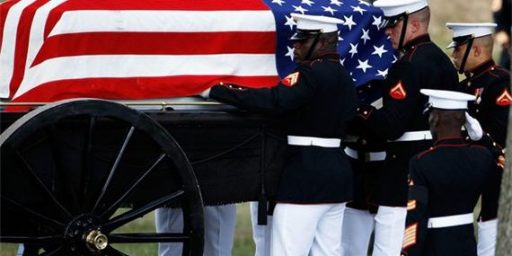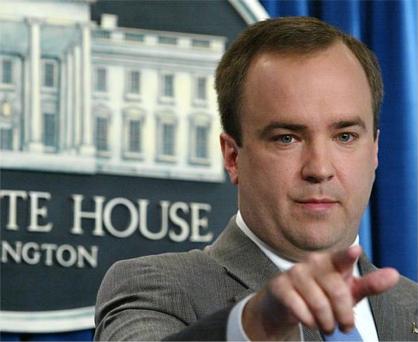Scott McClellan: We’ll End ‘Background’ If You Drop Anonymous Sources
The White House has a brilliant counter-proposal for the White House press corps.
Scott McClellan: We’ll End ‘Background’ If You Drop Anonymous Sources (Editor & Publisher)
Scott McClellan, President Bush’s press secretary, said Tuesday evening that he would be glad to end the use of background-only briefings–if White House reporters would stop using anonymous sources in their reporting. “I told them upfront that I would be the first to sign on if we could get an end to the use of anonymous sources in the media,” McClellan told E&P, referring to a meeting he had with a half-dozen Washington bureau chiefs last week. He said that “people in the heartland” feel that “anonymous sources use them to hide behind efforts to generate negative publicity.”
McClellan’s comments followed E&P’s report Tuesday that a group of top Washington bureau chiefs had launched a campaign to pressure government officials, including McClellan, to allow briefings with reporters to be held on the record. The bureau chiefs contend that the background-only briefings force them to use sourcing that is, essentially, anonymous, reducing their credibility.
Some veteran journalists have suggested that Washington reporters boycott background-only briefings to send a stronger signal. “Maybe it’s time to take another shot at it,” Ben Bradlee, former executive editor of The Washington Post, told E&P. He recalled a failed boycott attempt in the late 1960’s, which he says did not work because it did not have unified support. “There is certainly more interest in it now,” he declared. McClellan would not speculate on what a boycott would do, saying only “the best way to do this is to take steps to address the issue. To have them come in and sit down and talk about it, which we have.” He said that background briefings, which often precede a foreign trip or a policy speech, actually help reporters. “There is a need for [administration officials] to provide background without attribution,” McClellan said, citing a foreign trip as an example. “You might be providing context of what another country’s views are and they might take exception to doing that on the record.” He also pointed out that “you probably already have on-the-record comments from the secretary of state or national security advisor.” So why have others on background only? “It is something most reporters appreciate in that context.”
McClellan is right. Background briefs provide valuable insights for reporters so that the on-the-record discoveries they make will have context. On the other hand, while there are times when anonymous sourcing may outweigh its disadvantages, it’s mostly a way for cowards to violate the trust of their office without suffering consequences.
Somehow, I don’t see the press agreeing to this deal.
Update (1449): McClellan says E&P “misinterpreted” his remarks. E&P “stands by its original report.”






I’m not so sure we want to raise the bar for whistle blowers to the point where they have to fall on their swords if they want to tell the truth…
On the other hand, there’s nothing stopping anyone from meeting secretly with a reporter — this is only about the background briefs.
Why doesn’t the White House continue to–to use Bush’s term (or was it Chomsky’s)–“bypass the filter” of the media by spending more money on PR hacks?
This conversation between (mostly among) the MSM and the White House is sort of like listening to junkies say that they would quit if the sun rose in the west. They really never intend to change but like to look like they are making an effort.